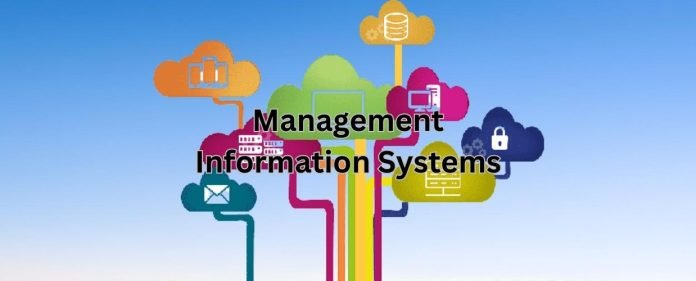In the intricate web of modern business operations, Management Information Systems (MIS) have emerged as the navigational compass, guiding organizations through data management, analysis, and decision-making complexities. These systems integrate technology, processes, and data to give executives and managers the insights needed to make informed choices and drive operational excellence. This article delves into Management Information Systems, exploring their definition, components, benefits, challenges, real-world applications, and their pivotal role in shaping organizational success.
Defining Management Information Systems
In the intricate web of modern business operations, Management Information Systems (MIS) have emerged as the navigational compass, guiding organizations through data management, analysis, and decision-making complexities. These systems integrate technology, processes, and data to give executives and managers the insights needed to make informed choices and drive operational excellence.
Components of Management Information Systems
An effective Management Information System (MIS) comprises three components: data collection, processing, and reporting. These components provide decision-makers with accurate, timely, and relevant information.
Hardware
The physical devices that facilitate data input, processing, and output, including computers, servers, networking devices, and mobile devices. These components are constantly evolving, with advancements such as high-performance processors and cloud-based infrastructure enhancing the speed and scalability of MIS.
Software
Applications and programs that analyze and process data, turning it into valuable information. It includes database management systems (DBMS), reporting tools, and analytics software. The software landscape is expanding to include AI-driven analytics, natural language processing, and data visualization tools, enabling more sophisticated data interpretation.
Data
Raw facts, figures, and observations that serve as the foundation for generating insights. Data can be collected from various sources, both internal and external. Data quality management and governance are gaining prominence to ensure accurate and reliable inputs for MIS.
Procedures
Documented processes and protocols that guide how data is collected, processed, and used within the organization. Standard operating procedures ensure consistency and accuracy. As organizations adopt agile methodologies, systems must be flexible and adaptable to changing business needs.
People
The individuals who manage, use, and interact with the MIS, including IT professionals, data analysts, and decision-makers. The role of data scientists and data engineers is becoming more critical in extracting meaningful insights from complex datasets.
Benefits of Management Information Systems
Management Information Systems have numerous benefits for organizations. By providing accurate, timely, and relevant information to decision-makers, MIS can help organizations make informed decisions and achieve their goals more effectively.
- Informed Decision-Making: MIS provides timely, accurate, and relevant information to managers, enabling them to make well-informed decisions that align with organizational goals. Real-time data integration and predictive analytics empower decision-makers with actionable insights.
- Efficient Operations: By automating data collection and processing, MIS streamlines business processes and reduces manual effort, enhancing operational efficiency. Robotic process automation (RPA) is becoming integral in automating routine tasks.
- Strategic Planning: MIS offers insights into trends, patterns, and performance metrics, aiding executives in formulating long-term strategies and setting achievable goals. Scenario planning and predictive modeling contribute to more effective strategic planning.
- Improved Communication: MIS facilitates data sharing and collaboration among departments, promoting effective organizational communication and synergy. Collaborative platforms and shared dashboards enhance cross-functional cooperation.
- Performance Monitoring: Managers can monitor key performance indicators (KPIs) and metrics in real time, enabling proactive interventions to address issues and capitalize on opportunities. Performance scorecards and visualizations enhance real-time monitoring.
Real-World Applications of Management Information Systems
Real-World Applications of Management Information Systems are highly versatile and can be utilized in various industries and operational settings.
- Supply Chain Management: MIS optimizes inventory levels, tracks shipments, and enhances coordination among suppliers, distributors, and manufacturers—supply chain analytics leverage data from IoT sensors and blockchain for end-to-end visibility.
- Financial Management: MIS aids in budgeting, financial analysis, and risk assessment by providing accurate and up-to-date financial data. Predictive analytics and algorithmic trading are transforming financial decision-making.
- Human Resources: MIS supports talent acquisition, employee performance evaluation, payroll processing, and workforce planning. People analytics leverage employee data for talent retention and succession planning.
- Marketing and Sales: MIS assists in customer segmentation, market analysis, campaign tracking, and sales forecasting. Social media analytics and sentiment analysis provide insights into consumer behavior.
- Strategic Decision-Making: MIS aids top-level executives in making strategic decisions based on comprehensive insights and trends. AI-driven executive dashboards provide high-level overviews for strategic direction.
Challenges and Considerations of Management Information Systems
When implementing Management Information Systems, it is essential to consider the potential challenges and obstacles that may arise. These can include technological limitations, data security concerns, and employee resistance to change.
- Data Quality and Accuracy: Ensuring the accuracy and integrity of data is crucial to derive meaningful insights from MIS. Data cleansing and validation processes are essential to maintain data quality.
- Integration Complexity: Integrating diverse data sources and systems can be challenging, especially in large organizations with complex IT infrastructures. Data integration platforms and APIs facilitate seamless data flow.
- Security and Privacy: Protecting sensitive data from breaches and unauthorized access requires robust security measures. Encryption, access controls, and compliance with data protection regulations are paramount.
- Change Management: Implementing new MIS systems may require training and change management strategies to ensure successful adoption by users—user training and change communication plan support smooth transitions.
Future Directions and Developments
As technology advances rapidly, management information systems’ future directions and developments are becoming increasingly important.
- Advanced Analytics: MIS will increasingly incorporate advanced analytics, including predictive and prescriptive analytics, to provide deeper insights and actionable recommendations. Machine learning models will drive proactive decision-making.
- Artificial Intelligence and Machine Learning: AI and ML will enhance MIS capabilities by automating data analysis and decision-making processes. AI-powered chatbots and virtual assistants will provide real-time insights to users.
- Real-Time Insights: Technologies like IoT will enable MIS to provide real-time insights from connected devices and sensors, facilitating proactive decision-making. Real-time data streaming and edge computing will enhance responsiveness.
- Personalized Insights: MIS will offer customized dashboards and reports tailored to individual user roles and responsibilities. AI-driven personalization will present relevant insights to different stakeholders.
Conclusion
Management Information Systems have evolved from data processing tools to strategic assets that empower organizations to navigate the complexities of the modern business landscape. By providing accurate, timely, and actionable insights, MIS equips decision-makers with the tools to steer their organizations toward success, efficiency, and innovation.
As technology advances and data becomes an even more valuable resource, the role of Management Information Systems will remain pivotal, shaping the future of effective management and strategic planning across industries and sectors. With each innovation and development, MIS becomes an even more indispensable ally in pursuing organizational excellence and growth.



